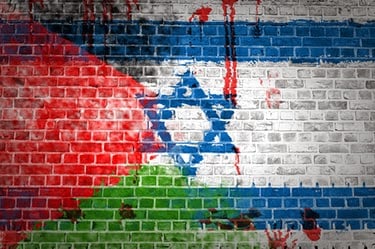WhatsApp Messages Show Israeli Soldiers Knew They Were About to Kill a Child

In March 2014, Israeli soldiers were ordered to use live ammunition to ambush three Palestinian teens in the southern region of the occupied West Bank, according to an investigation by the Israeli rights group B’Tselem.
Yousef al-Shawamreh, 14, was fatally shot in the back and hip as he and two friends attempted to cross Israel’s wall inside the West Bank from their village of Deir al-Asal al-Fawqa on the morning of 19 March.
According to B’Tselem’s investigation, al-Shawamreh was shot and killed “in broad daylight, although he posed no danger.” The rights group obtained a partial copy of the investigation file and a video of the shooting from the Israeli military. The video, above, shows the soldiers methodically carrying out an ambush that resulted in the killing of a child.
Messages exchanged between the soldiers throughout the incident on the messaging service WhatsApp ”showed that at least some of the soldiers believed the three Palestinians to be minors,” B’Tselem states.

WhatsApp messages exchanged between soldiers, and shown in B’Tselem’s video, indicate that some knew they were about to ambush children.
In the place where al-Shawamreh was killed, as is the case in many parts of the West Bank, the Israeli-built wall is not situated on the boundary line between Deir al-Asal al-Fawqa and present-day Israel. Because the wall is located some 200 meters inside the West Bank, it severs local Palestinian farmers from their agricultural land, forcing many of them to risk their lives crossing the wall in order to make a living.
Accompanied by two other boys, al-Shawamreh was crossing the wall in order to access agricultural land, Defence for Children International – Palestine Section (DCI-Palestine) reported at the time.
Upon arriving at the wall, where a hole frequently used by local Palestinians had been sealed off, the boys cut the wire and continued into a “buffer zone” between the fence and the dissected agricultural lands. Israeli soldiers then emerged from hiding and ambushed them, shooting and killing al-Shawamreh.
The Israeli military subsequently opened an investigation into al-Shawamreh’s slaying, but it was closed four months later without indictments. There was “no suspicion that the open-fire regulations had been breached or that any military personnel were involved in criminal action,” Israeli military advocate Lieutenant-Colonel Ronen Hirsh wrote in a letter to B’Tselem.
Killed “in broad daylight”
According to the investigation file, the soldiers who ambushed the boys and killed al-Shawamreh were stationed in hiding in order to prevent any damage to the separation barrier. Yet, B’Tselem notes that “the [soldiers] waited until after the damage was done and only then revealed their presence and shot at the three [boys].”
The file also notes that Sergeant Major Ofir, who ordered the ambush, told military investigators they had sealed all the holes in the fence in order to be certain that anyone crossing the barrier was a “fence saboteur” and thus a legitimate target for live ammunition, according to his logic.
“Sergeant Major Ofir described how the marksman made sure when the ambush began that he had ‘a clean line of fire’ to the sealed gaps in the fence,” the B’Tselem report notes, citing the military investigation file.
B’Tselem dismissed the military investigation as choosing “to address the commanders’ responsibility superficially, if at all.”
“The decision to mount an ambush armed with live ammunition only, the planning of a line of fire at anyone crossing the fence, and the vague open-fire orders that the soldiers received – all these attest to command responsibility for the unlawful shooting of [al-Shawamreh],” the group concludes.
Impunity
Al-Shawamreh was just one of hundreds of Palestinian children killed by Israeli occupation forces or settlers in 2014. At least sixteen Palestinians were killed in the occupied West Bank, including East Jerusalem, and the deaths of 538 children during Israel’s 51-day assault on the Gaza Strip have been verified, according to DCI-Palestine.
The impunity enjoyed by the soldiers who killed al-Shawamreh is not rare, either. A September 2014 reportpublished by the Israeli rights group Yesh Din found that only 1.4 percent of complaints issued to Israeli military authorities between 2010 and 2013 resulted in an indictment. Of these, only a tiny fraction result in more than symbolic sanctions.
Most recently, the Israeli military exonerated itself over the slaying of four Palestinian children on a Gaza beach during the 51-day attack on the besieged territory. The boys – aged between 9 and 11 – had been playing football just before three Israeli shells took their lives.
In addition to frequently injuring children with weapons like rubber-coated steel bullets, at least 35 children were injured by live ammunition as of May, according to DCI-Palestine. Israeli forces have killed one Palestinian teen so far this year. Ali Abu Ghannam, 17, was shot dead by Israeli soldiers in occupied East Jerusalem in April.
Israeli soldiers alleged that he attacked them with a knife, but his family dismissed the claims and insisted that Ghannam was killed “in cold blood.”

